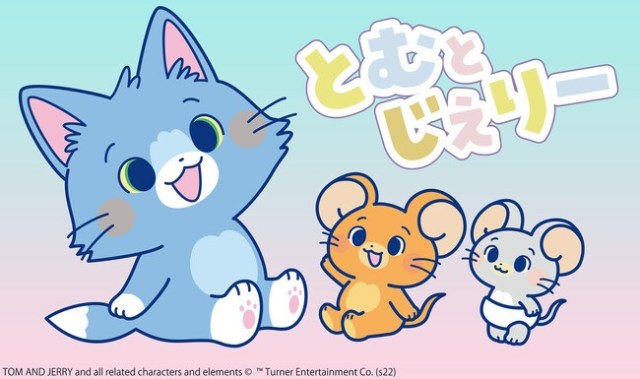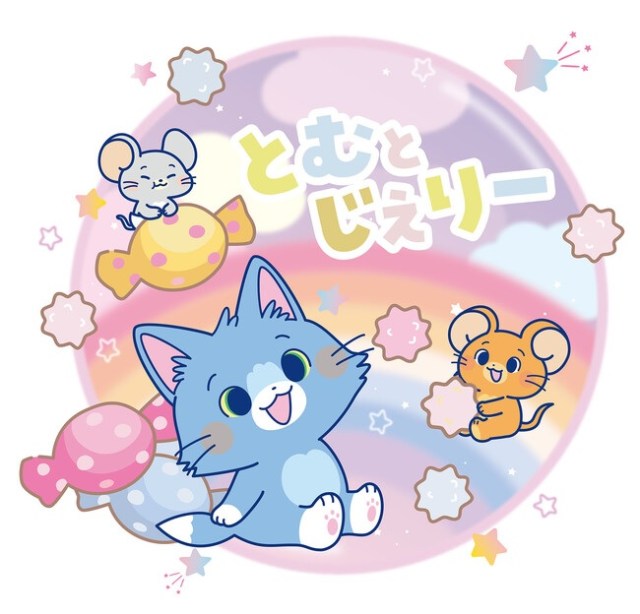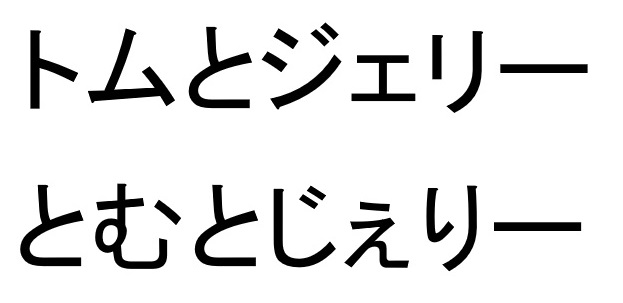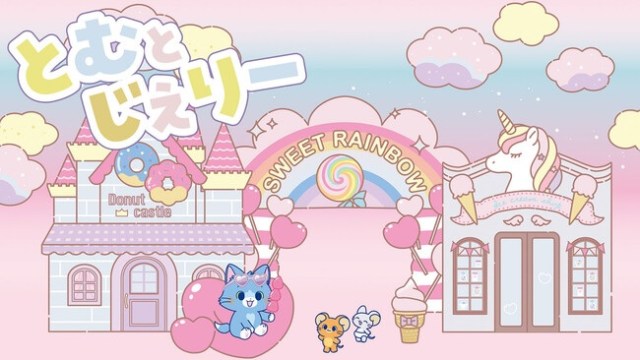
They also seem to have gained transformation powers.
American animation that isn’t either produced by Disney or theatrical-feature is sort of a niche market in Japan, but there’s enough interest for Cartoon Network to have a Japanese division, which broadcasts a lot of the same for-kids series that they do in the U.S.
This month, though, Cartoon Network Japan is debuting a new series that’s made in Japan, featuring a cast of adorable animal characters who look like they could give Hello Kitty and her Sanrio pals a run for their money in the cuteness department. The series stars a cat and a mouse, and their names are Tom and Jerry.
Yes, that Tom and Jerry, as the classic American cartoon duo has been given new, kawaii character design remakes for their first ever made-in-Japan series.
Even the series’ title is getting a more Japanese-looking overhaul. Ordinarily, when Tom and Jerry is written in Japanese, both of their names are written in katakana, the type of Japanese text used to render foreign names and loanwords. For the new, cuter series, though, Tom and Jerry’s names are written in hiragana. Hiragana is usually used for Japanese names and words, but the script is also visually softer and cuter than the more angular katakana.
▼ Tom and Jerry, with their names in katakana (top) and hiragana (bottom)
In terms of tone, it sounds like the hiragana Tom and Jerry won’t be quite as mercilessly violent as their katakana counterparts. The producers describe it as “Adding a topping of kawaii to the speedy, humorous movement of the good-natured fights Tom and Jerry always get into.” They’re also joined by Tuffy (also known by the name Nibbles), and apparently all three of them have the ability to transform into cute things like candies and sweets.
The new drawn-in-Japan Tom and Jerry cartoons aren’t replacing the old ones in Japan, though. The new Tom and Jerry will be a series of animated shorts shown on Cartoon Network’s Japan broadcast, debuting as part of a special block of various Tom and Jerry cartoons on November 11, which is Cheese Day in Japan’s extensive list of quasi-holidays, because November used to be the customary time for making sou, which was the closest thing Japan had to cheese back in the olden times.
Source: PR Times
Top image: PR Times
Insert images: PR Times, SoraNews24
● Want to hear about SoraNews24’s latest articles as soon as they’re published? Follow us on Facebook and Twitter!
[ Read in Japanese ]




 Say “I do” with Tom and Jerry marriage certificates from Japan
Say “I do” with Tom and Jerry marriage certificates from Japan Limited-time Tom and Jerry cafés are now open in Tokyo and Shinjuku to serve up cartoony cuisine
Limited-time Tom and Jerry cafés are now open in Tokyo and Shinjuku to serve up cartoony cuisine Tom Cruise makes our reporter swoon at Top Gun: Maverick premiere in Japan
Tom Cruise makes our reporter swoon at Top Gun: Maverick premiere in Japan Yahoo! Japan finds most alphabetic and katakana words Japanese people want to find out about
Yahoo! Japan finds most alphabetic and katakana words Japanese people want to find out about Hit anime FLCL getting sequel series 15 years after its last episode in U.S.-Japan co-production
Hit anime FLCL getting sequel series 15 years after its last episode in U.S.-Japan co-production Japan Extreme Budget Travel! A trip from Tokyo to Izumo for just 30,000 yen [Part 2]
Japan Extreme Budget Travel! A trip from Tokyo to Izumo for just 30,000 yen [Part 2] Lawson adds doughnuts to its convenience store sweets range, but are they good enough to go viral?
Lawson adds doughnuts to its convenience store sweets range, but are they good enough to go viral? The best Hobonichi diaries, covers and stationery for 2026
The best Hobonichi diaries, covers and stationery for 2026 Police called out to investigate suspicious Santa in Wakayama
Police called out to investigate suspicious Santa in Wakayama New smartphone game turns car models into anime girls with model-worthy looks
New smartphone game turns car models into anime girls with model-worthy looks Brand-new Pokémon park opens in Japan with larger-than-life-size Lapras【Photos】
Brand-new Pokémon park opens in Japan with larger-than-life-size Lapras【Photos】 Studio Ghibli director Hayao Miyazaki reveals the name of his next feature film
Studio Ghibli director Hayao Miyazaki reveals the name of his next feature film Drift ice in Japan is a disappearing winter miracle you need to see now
Drift ice in Japan is a disappearing winter miracle you need to see now Viral Japanese cheesecake from Osaka has a lesser known rival called Aunt Wanda
Viral Japanese cheesecake from Osaka has a lesser known rival called Aunt Wanda Tokyo street sweets: The must-snack treats of Nakano’s Refutei
Tokyo street sweets: The must-snack treats of Nakano’s Refutei Starbucks Japan releases first-ever Hinamatsuri Girls’ Day Frappuccino
Starbucks Japan releases first-ever Hinamatsuri Girls’ Day Frappuccino Japanese restaurant chain serves Dragon Ball donuts and Senzu Beans this spring
Japanese restaurant chain serves Dragon Ball donuts and Senzu Beans this spring Highest Starbucks in Japan set to open this spring in the Tokyo sky
Highest Starbucks in Japan set to open this spring in the Tokyo sky Tokyo Skytree turns pink for the cherry blossom season
Tokyo Skytree turns pink for the cherry blossom season Japan Extreme Budget Travel! A trip from Tokyo to Izumo for just 30,000 yen [Part 1]
Japan Extreme Budget Travel! A trip from Tokyo to Izumo for just 30,000 yen [Part 1] Yakuzen ramen restaurant in Tokyo is very different to a yakuza ramen restaurant
Yakuzen ramen restaurant in Tokyo is very different to a yakuza ramen restaurant Japan has only one airport named after a samurai, so let’s check out Kochi Ryoma【Photos】
Japan has only one airport named after a samurai, so let’s check out Kochi Ryoma【Photos】 Japanese drugstore sells onigiri at pre-stupid era prices, but how do they compare to 7-Eleven?
Japanese drugstore sells onigiri at pre-stupid era prices, but how do they compare to 7-Eleven? Adorable Totoro acorn key holders come with a special guest hidden inside[Photos]
Adorable Totoro acorn key holders come with a special guest hidden inside[Photos] Japan’s newest Shinkansen has no seats…or passengers [Video]
Japan’s newest Shinkansen has no seats…or passengers [Video] Starbucks Japan releases new sakura goods and drinkware for cherry blossom season 2026
Starbucks Japan releases new sakura goods and drinkware for cherry blossom season 2026 Foreigners accounting for over 80 percent of off-course skiers needing rescue in Japan’s Hokkaido
Foreigners accounting for over 80 percent of off-course skiers needing rescue in Japan’s Hokkaido Super-salty pizza sends six kids to the hospital in Japan, linguistics blamed
Super-salty pizza sends six kids to the hospital in Japan, linguistics blamed Starbucks Japan unveils new sakura Frappuccino for cherry blossom season 2026
Starbucks Japan unveils new sakura Frappuccino for cherry blossom season 2026 Foreign tourists in Japan will get free Shinkansen tickets to promote regional tourism
Foreign tourists in Japan will get free Shinkansen tickets to promote regional tourism The 10 most annoying things foreign tourists do on Japanese trains, according to locals
The 10 most annoying things foreign tourists do on Japanese trains, according to locals Take a trip to Japan’s Dododo Land, the most irritating place on Earth
Take a trip to Japan’s Dododo Land, the most irritating place on Earth Naruto and Converse team up for new line of shinobi sneakers[Photos]
Naruto and Converse team up for new line of shinobi sneakers[Photos] Is China’s don’t-go-to-Japan warning affecting the lines at a popular Tokyo gyukatsu restaurant?
Is China’s don’t-go-to-Japan warning affecting the lines at a popular Tokyo gyukatsu restaurant? Survey asks foreign tourists what bothered them in Japan, more than half gave same answer
Survey asks foreign tourists what bothered them in Japan, more than half gave same answer Japan’s human washing machines will go on sale to general public, demos to be held in Tokyo
Japan’s human washing machines will go on sale to general public, demos to be held in Tokyo Starbucks Japan releases new drinkware and goods for Valentine’s Day
Starbucks Japan releases new drinkware and goods for Valentine’s Day We deeply regret going into this tunnel on our walk in the mountains of Japan
We deeply regret going into this tunnel on our walk in the mountains of Japan Studio Ghibli releases Kodama forest spirits from Princess Mononoke to light up your home
Studio Ghibli releases Kodama forest spirits from Princess Mononoke to light up your home Major Japanese hotel chain says reservations via overseas booking sites may not be valid
Major Japanese hotel chain says reservations via overseas booking sites may not be valid Put sesame oil in your coffee? Japanese maker says it’s the best way to start your day【Taste test】
Put sesame oil in your coffee? Japanese maker says it’s the best way to start your day【Taste test】 No more using real katana for tourism activities, Japan’s National Police Agency says
No more using real katana for tourism activities, Japan’s National Police Agency says A skeptic’s guide to anime – Five series to ease you into Japan’s most popular export
A skeptic’s guide to anime – Five series to ease you into Japan’s most popular export Harry Potter cast goes anime-style in new line of Japan-exclusive merchandise
Harry Potter cast goes anime-style in new line of Japan-exclusive merchandise New anime features Nyanbo, the adorable box-shaped cardboard cat
New anime features Nyanbo, the adorable box-shaped cardboard cat AI is being used to write a new chapter in the God of Manga’s Black Jack series
AI is being used to write a new chapter in the God of Manga’s Black Jack series McDonald’s new Happy Meals offer up cute and practical Sanrio lifestyle goods
McDonald’s new Happy Meals offer up cute and practical Sanrio lifestyle goods Gundam Cafe serves up new meals and drinks from the anime series in Japan
Gundam Cafe serves up new meals and drinks from the anime series in Japan Real-life sake brands become handsome anime boys who promise to “get you drunk” for new series
Real-life sake brands become handsome anime boys who promise to “get you drunk” for new series Japan ranks the top 10 anime that will leave viewers in tears
Japan ranks the top 10 anime that will leave viewers in tears The new Kyoto Animation commercials will have you in tears in just 30 seconds
The new Kyoto Animation commercials will have you in tears in just 30 seconds 6 predictions: Which brand new Japanese anime will be the dark-horse hit of 2020?【Videos】
6 predictions: Which brand new Japanese anime will be the dark-horse hit of 2020?【Videos】 Heartbroken visitors leave tributes to Japan’s anime-loving penguin Grape-kun at new memorial
Heartbroken visitors leave tributes to Japan’s anime-loving penguin Grape-kun at new memorial McDonald’s Japan has Precure anime magical girl Happy Meal toys, and they’re Wonderful!【Photos】
McDonald’s Japan has Precure anime magical girl Happy Meal toys, and they’re Wonderful!【Photos】